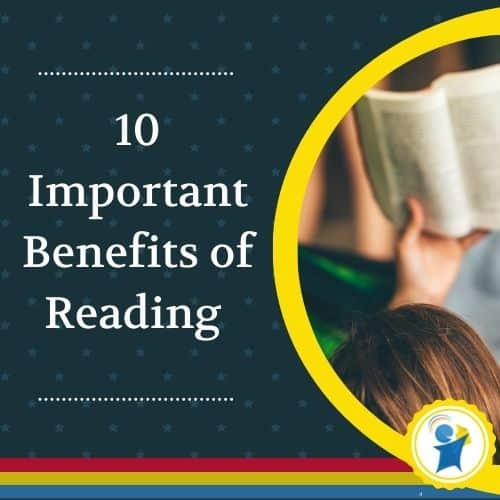
How does your child fare with reading? It is one of the first and most important skills taught at school. The benefits of reading are far-reaching throughout your child’s life, while poor reading skills may have dire consequences.
In simple terms, literacy is the ability to read and write, as well as understand and analyze the written word. The implications of a child struggling to read is serious; a poor reader is usually also a poor learner.
Academic, emotional, and social issues abound for children who are behind their peers in reading. They may struggle with low self-esteem and feelings of inadequacy. Low achievement in reading is also the common denominator in school discipline, attendance and dropout problems, and juvenile crime.
So why is reading such a crucial skill in the modern age?
1. Reading is the foundation of academics
Reading is the skill by which students get information from books, computers, worksheets, and boards to learn math, science, literature, social studies, and more. As much as 85 percent of the curriculum is taught by reading. Therefore, children who are not reading on grade level by the end of third grade struggle in every class, year after year.
The struggling reader at school usually continues to struggle into adulthood. According to the National Assessment of Adult Literacy, 14 percent of adult Americans demonstrate a “below basic” literacy level, and 29 percent exhibit a “basic” reading level.
The National Literacy Trust states that 16 percent of adults in the United Kingdom are “functionally illiterate.” Functional illiterate means they can’t read the instructions on a medicine bottle, they can’t read a map, and they can’t read a recipe.
The same holds for 47 percent of the Australian population, says Jan Richards, manager of Central West Libraries.
2. Reading builds vocabulary
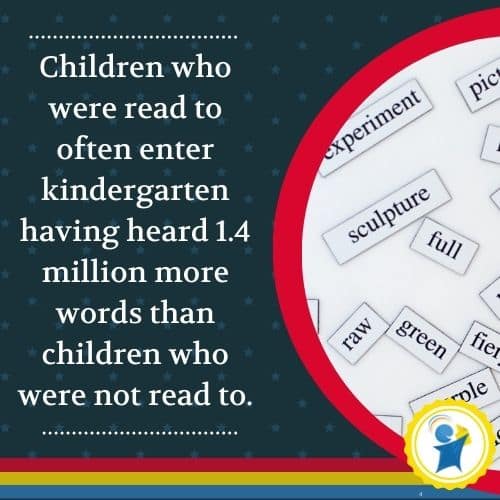
Reading will help your child learn new words and build their vocabulary. To gain from this benefit, parents need not wait until a child can read themselves but should start reading to them from a young age.
A study found that young children whose parents read them five books – board books and picture books – a day enter kindergarten having heard about 1.4 million more words than kids who were never read to. Here’s how many words kids would have heard by the time they were five years old, according to the study:
- Those who were never read to would have heard 4,662 words;
- those who were read to 1-2 times per week, 63,570;
- those who were read to 3-5 times per week, 169,520;
- those who were read to daily, 296,660; and
- those who listened to five books a day, 1,483,300.
3. Reading betters language skills
Children’s language skills improve as they read — from good grammar to learning how sentences and stories are structured. The more kids read, the better writers they become. Many subjects, especially in high school, require written essays where good writers can obtain better marks.
Regarding language skills, what we read plays an important role. In four separate studies, based on data from almost 1,000 young adults, Mar and Rain examined how reading fiction and non-fiction predicts verbal abilities. Compared to reading non-fiction, they found that reading fiction was the stronger and more consistent predictor of language skills.
4. Reading affects intellectual development
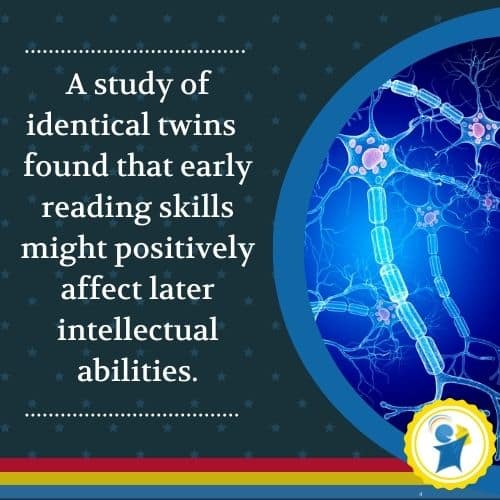
A study of identical twins has found that early reading skills might positively affect later intellectual abilities.
Researchers looked at 1,890 identical twins who were part of the Twins Early Development Study, an ongoing longitudinal study in the United Kingdom. They examined scores from tests of reading and intelligence taken when the twins were 7, 9, 10, 12, and 16.
The researchers linked earlier differences in reading between the twins to later differences in intelligence. Reading was associated not only with measures of verbal intelligence (such as vocabulary tests) but also with nonverbal intelligence scores (such as reasoning tests).
5. Readers are better spellers
Reading and spelling are two sides of the same coin. A study has shown that ninth-grade students tend to improve their spelling through reading, even when their attention is not directed toward spelling. Another study found the same applies to college students. On the other hand, because spelling is most effective at improving the quality of word representation, practicing spelling also boosts reading.
The ability to spell correctly is one of the fundamentals that will never cease to be essential. A survey of 1,500 employers and employees confirmed the advantage of good spelling ability in the workplace.
This survey revealed that 84 percent of employers believe that the value of even the most excellent work can be debased by sloppy spelling and grammar. The same survey found that 49 percent of employees do not check through their work but rely only on computer spell check programs to spot and amend mistakes. Unfortunately, these spell-check programs are not flawless.
6. Reading can be a social activity
Parents and caregivers can use reading to a younger child to create a daily bonding time. Book clubs or library storytime bring children from all walks of life together. They learn listening skills and get opportunities to articulate what they have heard and give their opinions on what they have read. Book clubs are also great for seniors to reach out and make new friends.
A study from the University of Liverpool found that reading helped patients suffering from depression in terms of their social well-being by increasing personal confidence, reducing social isolation, fostering a sense of community, and encouraging communication skills.
7. Reading has economic benefits
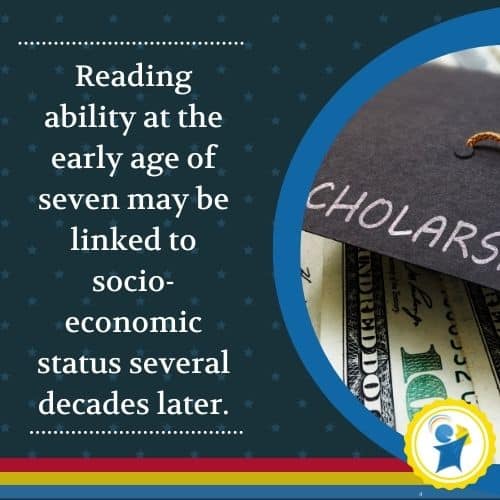
According to research published in Psychological Science, reading ability at the early age of seven may be linked to socio-economic status several decades later.
Following more than 17,000 people in England, Scotland, and Wales over a span of about 50 years, Ritchie and Bates found that participants’ reading and math abilities at age seven were linked to their social class a full 35 years later.
Children with higher reading and math skills later had higher incomes, better housing, and better jobs in adulthood. The data suggest, for example, that achieving one reading level higher at age seven was associated with a £5,000 (roughly $7,750) increase in income at age 42.
8. Reading is key to enrichment
While reading is crucial for learning and achieving throughout the school career and into university, reading can also enrich a child’s life outside the classroom.
Avid readers often have excellent general knowledge. General knowledge stretches way beyond knowing the answers to trivia questions and quizzes. General knowledge and current affairs are instant conversation starters, so being up-to-date on current affairs and having basic knowledge of various subjects can make you a more sociable and successful person. Having a good sense of humor is also easier if you are knowledgeable.
General knowledge makes you street-smart and helps you make well-informed decisions. You’ll be better able to keep up with your child’s worldview, in addition to being able to help them with projects and homework.
9. You may live longer
A long-term health and retirement study followed a cohort of 3,635 adult participants for a period of 12 years. The study found that those who read books for an average of 30 minutes per day – say, a chapter a day – showed a survival advantage significantly greater than those reading newspapers or magazines. In fact, those who read books survived around two years longer than those who either didn’t read or read magazines and other forms of media.
These findings suggest that the benefits of reading books include a longer life in which to read them.
10. Reading strengthens your brain
A study investigated structural brain changes that co-occur with reading acquisition in typically developing children and demonstrated relationships between cortical volume and three components of skilled reading: rapid naming, word reading, and fluency.
Another study compared the time spent using screen-based media or reading on the functional connectivity of the reading-related brain regions in children aged 8-12. Greater reported reading time correlated positively with increased functional connectivity between the visual word form area (VWFA) and regions supporting higher-order visual processing, language, executive functions, and cognitive control. In the largest study of its kind up to date, Brem et al. (2020) confirmed that the VWFA is key to fluent reading.
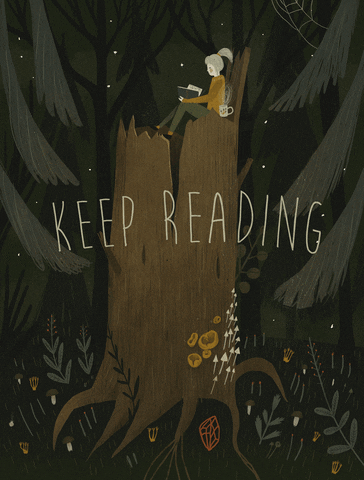
Higher reported screen time correlated with decreased functional connectivity between the VWFA and the regions related to language and cognitive control.
These findings underscore the importance of children reading to support healthy brain development and literacy and to limit screen time.
Today parents face the challenge of raising children in a digital world, and limiting screen time is easier said than done. Digital devices play an important role in our children’s lives, but parents should also encourage kids to read print books. Holding a book and turning pages is a tactile experience for children. They tend to concentrate more on reading the actual words and understanding the story than anticipating what clicking on the next icon will bring.
Happy reading!


